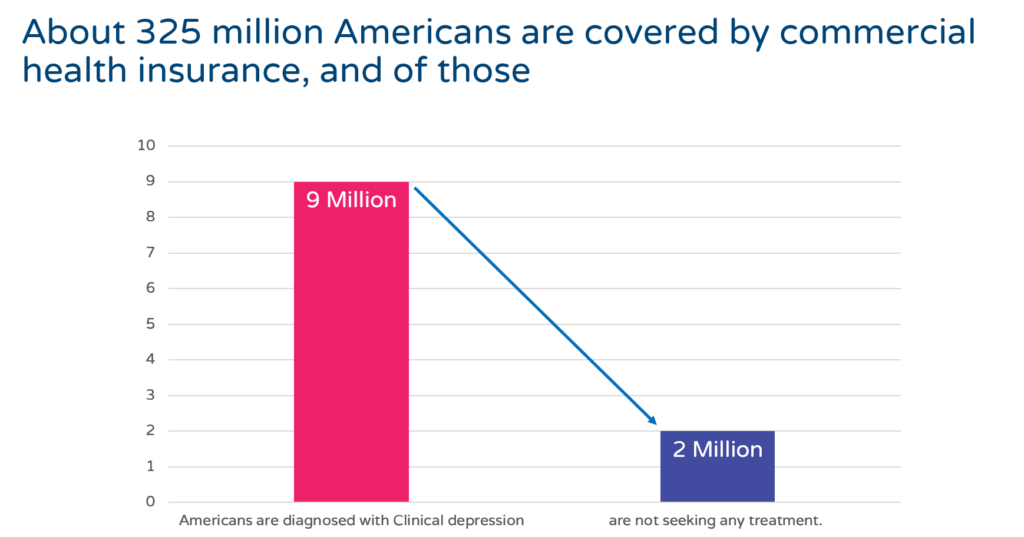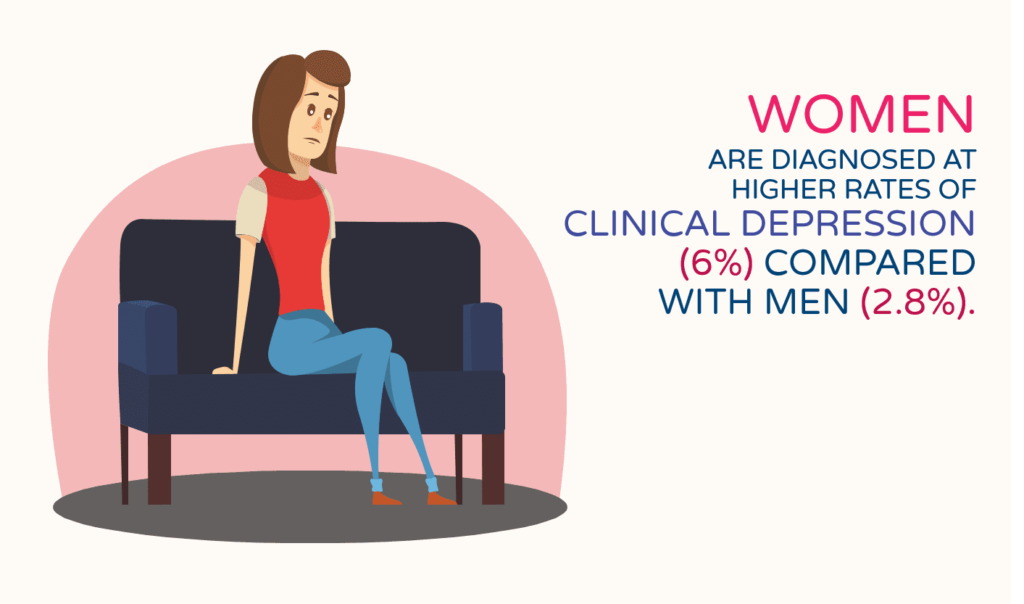Contents
Women are diagnosed at higher rates of clinical depression compared with men as reported in the BCBS report
Blue Cross Blue Shield (BCBS) published a report just over a year ago which drew attention to the impact on the overall health of Major Depression also known as depressive disorder or clinical depression.
As recently as March 2019, BCBS has drawn further attention to the significance of clinical depression for commercially insured Americans.

About 325 million Americans are covered by commercial health insurance and of those,
- 9 million Americans are diagnosed with Clinical depression
- 2 million are not seeking any treatment.
Source: Major depression-The impact on overall health
The obvious question is WHY? But first, we should learn to recognize the signs of depression in ourselves and secondly in those around us, our loved ones especially, teenagers and older adults.
There are ten common signs of depression.
- Feelings of helplessness
- Loss of interest in daily activities
- Appetite or weight changes
- Changes in sleeping patterns
- Irrational anger or irritability
- Loss of energy
- Strong feelings of worthlessness
- Reckless behavior
- Problems with concentration
- Unexpected aches and pins
Source: www.helpguide.org/about-us.htm
Gender differences

There is a significant difference in the diagnosis of clinical depression between men and women. The overall rate is 4.4% (i.e. 9 million Americans). Women are diagnosed at higher rates of clinical depression (6%) compared with men (2.8%).
Age differences
The diagnosis rate for clinical depression continues to climb (between 2013 and 2016 it rose by 63% among adolescents and 47% among millennials). Here too the diagnosis rate is higher for girls than boys.
Patterns such as those in younger age groups have long term implications for the management of the condition in their early years and crucially to their long-term wellbeing.
And next
How can you help your near and dear ones?
Teenagers
We listed 10 signs of depression. Any of us will experience one or more of them at one time or another. They are part of life’s ups and downs. Teenagers may not have developed the resilience to compensate.
Teenagers will be teenagers, but the signs of ‘clinical depression’ may be constant irritability, anger or agitation.
Older adults
The same list applies but older adults are more likely to complain about their physical condition rather than their state of mind. Outward signs of depression may be that they neglect their personal appearance or take less interest in taking essential medications.
Know when to seek professional help?
It is important to understand that the underlying cause of depression may be circumstantial.
It may not be easy but
- A new job
- New friends
- New interests
These are lifestyle changes. But a change in routine may be all it takes. Activity is often its own anti-depressant!
For many people, acknowledgment of their state of mind, young or old, the support of family and friends will be the key which enables them to re-engage.
In some cases, it makes sense to involve a mental health professional.
Do not regard this as a last resort! There are many approaches to the treatment of clinical depression.
Treatment
Broadly speaking the condition responds to THERAPY which provides the self-knowledge and motivation to cope with ‘depression’ and the insight to prevent its return.
In some cases, your Physician or Therapist will suggest anti-depressant prescription drugs.
Increasingly, health professionals are placing the emphasis on behavioral therapy for depression and other conditions.
The BlueCross BlueShield (BCBS) report also draws attention to the correlation between clinical depression and other conditions.

85% of patients identified as suffering from clinical depression were also diagnosed with one or more behavioral or pain-related health conditions such as Diabetes(type2) and hypertension (high blood pressure).
Does health insurance cover clinical depression?
Plans sold on the health insurance marketplace are required to cover mental health, including Clinical Depression. These plans must cover the ten essential health benefits, as defined under the health care law. The benefits generally cannot be more restrictive than coverage for medical and surgical services.
Take action-Do not be one in the 9 million!
If you suspect that you or any of your dependents shows one or more of the symptoms described in the article talk to your physician. Based on their advice you may be better informed when choosing your health insurance for 2020 (open enrollment runs from November 1st– December 15th).
Photo by Andrew Neel from Pexels

